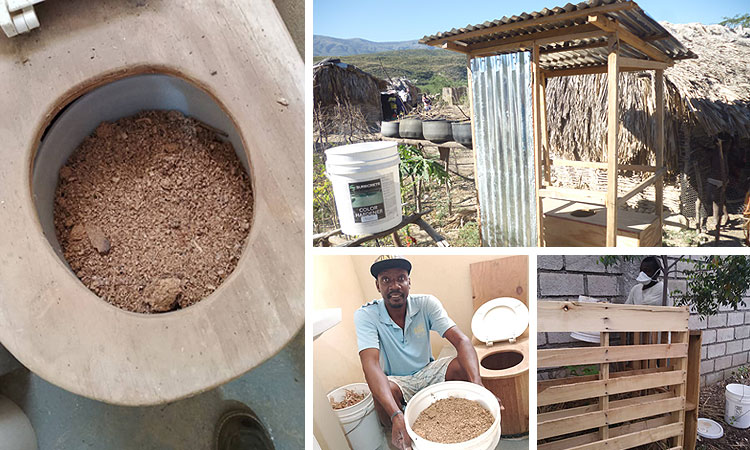It is estimated that throughout rural Haiti there is more than 26% “open defecation,” meaning that in most of the country 1 in 4 Haitians do not have any access to any type of toilet. This would be bad even in your own isolated home, but think of what this means for remote villages where population density is higher. This creates a severe public health problem. This poor condition is very easy to treat though. At the Agricultural Training Center (ATC) we demonstrate and teach using a basic compost toilet – “twalet konpost” – made from a 5 gal. bucket and some organic “cover” material, like sawdust, dried leaves, chopped-up vetiver grass, and even sugar cane bagasse (the dry left-over material from processing sugar cane). Any sort of dry organic material can be used as the “cover” material, which is how you “flush” a compost toilet. These simple toilets rely on science to eliminate odors and turn waste into useful fertilizer by microbial action. At the ATC we have these simple compost toilets for our workers, students, and visitors. They are simple to maintain and when covered properly, really have no odors… really. We empty the full toilet into a bin (ours is made from shipping pallets) and allow the microbes to convert the waste into safe, rich fertilizer in a matter of months. In Old LeTant and Peyi Pouri, we introduced another composting method called the “Arborloo.” An Arborloo is a communal composting toilet (like an outhouse) that is re-locatable after the hole is filled up. After the Arborloo is relocated to a fresh hole, a tree is planted in the old site, and boy, does it grow well! These simple compost toilets are a great improvement in daily sanitation and hygiene, with the added bonus of having a great natural organic fertilizer useable for trees. We do not use the compost from these toilets for vegetables, only for trees and other non-edible biomass plants. This is “centuries-old new technology” helping and benefiting the Haitian families. Thank you for supporting our Sustainability Outreach Programs that are teaching Haitians how to help themselves.
Rad Hazelip, Assistant Executive Director – Love A Child


